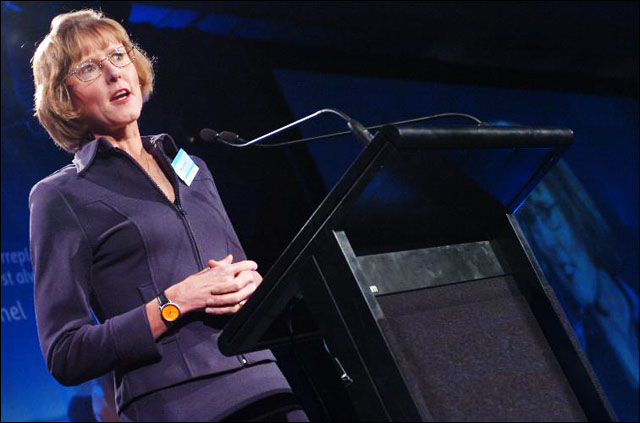Watching the NBN: Senator Mary Jo Fisher

profile A lawyer with a strong background in dealing with farmers' workplace issues, South Australian Senator Mary Jo Fisher probably never expected to become so involved in the highly technical world of information technology and telecommunications.

Mary Jo Fisher (Credit: Office of Mary Jo Fisher)
In fact, the politician strongly denies being an IT expert of any stripe. "A nerd in my language is somebody who knows about IT, so I'm definitely not [a nerd]," she says.
However, despite her best intentions, Fisher is currently enmeshed in all things "nerd". As deputy chair of the Senate's Environment and Communications Committee, Fisher has become one of the chief figures in the Federal Opposition charged with keeping the Federal Government and its multibillion-dollar National Broadband Network (NBN) initiative accountable to the people.
To an outsider, it's not immediately obvious where Fisher's interest in the NBN comes from.
After growing up in a farm near Beverley, in Western Australia, the senator graduated with a law degree in Perth before moving to South Australia, where she held roles in the state's bureaucracy and then later for federal workplace relations ministers in the Howard Government. In 2007 she began her mandate as senator, filling a vacancy created by Senator and Minister Amanda Vanstone.
The occasion to get her hands dirty in the ferocious arena of telecommunications came soon after her election to the Senate, when she chaired the NBN Senate Select Committee.
"I got involved very soon after the 2007 election," she recollects. "So I remember when 'lord love' Kevin announced NBN round one, so what we thought it was a lot of that time in a $4.7 billion spend on fibre-to-the-node; we started examining that in the committee I was chairing. And then of course within 12 months ... they ditched that promise and embarked on an enormous tenfold spend."
Money allocated by the Gillard Government to the roll-out of the NBN is indeed what comes to Fisher's mind, when she responds to a question about where her interest for the NBN roll-out comes from. "As far as the NBN is concerned, it's a shit load of money," she says, adding that the roll-out of the NBN is the biggest infrastructure spend in Australia's history.
Policy
Fisher is known in parliament for the vehemence and passion with which she attacks every issue she is interested in. At Senate hearings into the NBN, she can come across as relentless — peppering Conroy or NBN Co or departmental officials with dozens of questions about the project — all backed up with facts and figures quoted from an extensive library of sheets of paper stacked in front of her.
That role has led to some incredibly fraught late-night confrontations between Fisher and her arch-nemesis, Communications Minister Stephen Conroy, during the Senate Estimates process from which Fisher's dry, biting wit has become somewhat legendary in NBN circles.
"Hansard doesn't record rolling of the eyes," Fisher told Conroy, for example, in one late night session in October. And then, when an exemption had been granted on a certain matter: "Is that why you ran straight to the governor-general for an exemption instead of debating this process in the House? ... Thank you for that non-answer."
Fisher continues that tenacious trend in the interview, immediately moving on from her personal interest in the NBN to her views on the lack of a concrete cost-benefit analysis for the project, which the senator believes could have answered lots of the questions the Opposition is now asking about the NBN.
"How much should taxpayers be funding building of infrastructure in areas where the private sector would do it in a second because they can make money from it?" she demands to know. "If we had the fundamentals, if we had a cost-benefit analysis, it would have answered lots of these questions and would have resolved lots of these issues, so that we could move on."
Fisher believes a lack of analysis and clarity — two of her personal hallmarks — are the issues responsible for the Opposition's hostility to NBN Co.
Speaking about the legislation related to the project, Fisher says there is a real risk that NBN Co could become a retailer in its own right and therefore be in competition with other providers in the market. She says the government has denied NBN Co would be competing with other providers, but at the same time hypocritically tried to exempt NBN Co from analysis by the parliament's Public Works Committee's analysis for commercial in confidence reasons.
"In my view, they argue on the one hand that NBN Co is not in competition ... and that on the other hand they go to the governor-general and claim that NBN Co will be in competition," she says. "And that therefore there will be commercial issues raised, and it should be exempt from consideration by the Public Works Committee."
One of the hottest topics in the NBN political battle is the opportunity for the NBN Co to retail services to utilities, like water and energy suppliers. Fisher says the utilities made it clear they would not use the NBN, unless granted an exemption to buy services from NBN Co directly. "The government is trying to use utilities as a prop to allow the violation of its promise that the NBN will not compete in retail," she says.
In "the world of an NBN", Fisher adds, one of the major issues lies in determining whether or not utilities are justified in seeking the exemption they currently enjoy. "And secondly, whether that exemption effectively means or not that the NBN Co is going to be in competition with retail service providers in terms of the services that are provided to utilities," she says.
Keeping our eyes open
Greens Senator Scott Ludlam — who also sits on the Environment and Communications Committee — said last year that 99 per cent of people on the street had never heard of the various Senate Committees. Ludlam said that there is a lot that could be done with such accountability mechanisms built into the parliament, which have been set up over the years at "great personal cost".
On this front, Fisher claims to have worked very hard behind the scenes with Ludlam and Independent Senator Nick Xenophon to form the new joint parliamentary committee into the NBN announced earlier this month and to be chaired by Independent MP Rob Oakeshott.
Fisher says she had believed it to be part of her job in the process to expose "the pup" that Prime Minister Julia Gillard was trying to sell to Senator Xenophon before Christmas time "to buy his vote" on the NBN. She referred to a letter Xenophon received by Gillard on the creation of an NBN committee whose composition would have mirrored the structure of an already existing one, which, Fisher says, had nine members from the government and seven shared among other parties.
She claims that the committee's terms of reference would have worked in the government's favour if Ludlam and Xenophon had not pushed for the creation of a new one.
"Over the break, thankfully, working with Ludlam and Xenophon, they were doing the negotiating with the government, not me, we now have arrived at what is going to be a joint parliamentary committee," she says. "It's the best thing we have got now, at least the numbers are more evenly balanced, and the terms of reference are more neutral." And it's in this arena that much of the public debate around the NBN will now take place.
Despite her criticism of the NBN, Fisher recognises the issues that have led to its creation, noting her understanding that the nation needs faster, more accessible internet for "as many Australians as possible". "It's just a matter of who, what, when, where, why, how; who gets what, when they get it, how they get it, and as I said by what means — fibre, wireless, satellite or a mix of — and how much do they have to pay for it?" she says.
"There are NBN sceptics, I'm one myself, but I don't think there are broadband sceptics: do you get the difference?" she says. Promptly, she rephrases her statement. "Perhaps what I prefer to say is we are NBN sceptics but not broadband deniers."
Fisher adds that if a coalition government was to be in power it would be mindful of what had already been rolled out. "We would not trash and burn taxpayers' investment without a good reason to do it," she says. Moreover, she says the Liberal Party truly believed in greater access to faster internet, and that a mix of technologies — fibre, wireless, satellite — was needed. "We're seeing that we need a mix of technology to deliver, and that includes fibre, it includes wireless and it includes satellite," she says.
Getting personal
While Senator Fisher does have a solid grasp of policy in the portfolios she works on and is a worthy opponent on the debating floor, she also has another side to her — a somewhat more care-free side.
The nation watched riveted in March this year as the politician stood up in the Senate and accused Labor of "dancing a very merry dance" on the issue of the carbon tax — a dance tune set by the Greens. But while others might have left their rhetoric at that, Fisher continued the metaphor, referring to dancing the "Hokey Pokey". "You put petrol in, you take petrol out," she said. "You put petrol in and you shake the tax about. You do the Hokey Pokey — and Ooh! You turn right around."
The Time Warp was also mentioned and on display. "It's astounding, time is fleeting — madness, it's going to take its toll," said Fisher, taking a step to the left. "Let's do the Time Warp again."
The video quickly made its way to YouTube, Twitter and Facebook where it was set to music and was watched by thousands. Fellow Liberal Senator for South Australia, Simon Birmingham, wittily commented on Twitter that if onlookers were lucky they could ask for "some Nutbush City Limits, a Costello-esque Macarena or ideally a little Achy Breaky Heart".
Senator Fisher is open to social media, but doesn't have an active Twitter account like colleagues Ludlam and Shadow Communications Minister Malcolm Turnbull do. Perhaps some of this parliamentary frivolity would help to enliven up the social media sphere.
"That's a work in progress, I'm considering to embrace the Twitter sphere," she says. "I'm not talking about any federal colleague here — but I'm not impressed by the banality of some of the Twitter messages that seem to catch attention. So I think Twitter can be very good to communicate with people, but I'm still thinking how to best do that as a pollie."
And despite being not a "nerd", does Fisher use technology much herself? The senator says she used to have a broadband connection at home, but these days she tends to rely on her BlackBerry only. With a touch of humour, she adds, that while much of the IT jargon around was still hard to understand at times, it wasn't worth worrying about it.
"It doesn't concern me that I don't know so much, when our Shadow [Turnbull] knows so much about IT and the modern world of communication," she says. "People like me are a good balance for him."